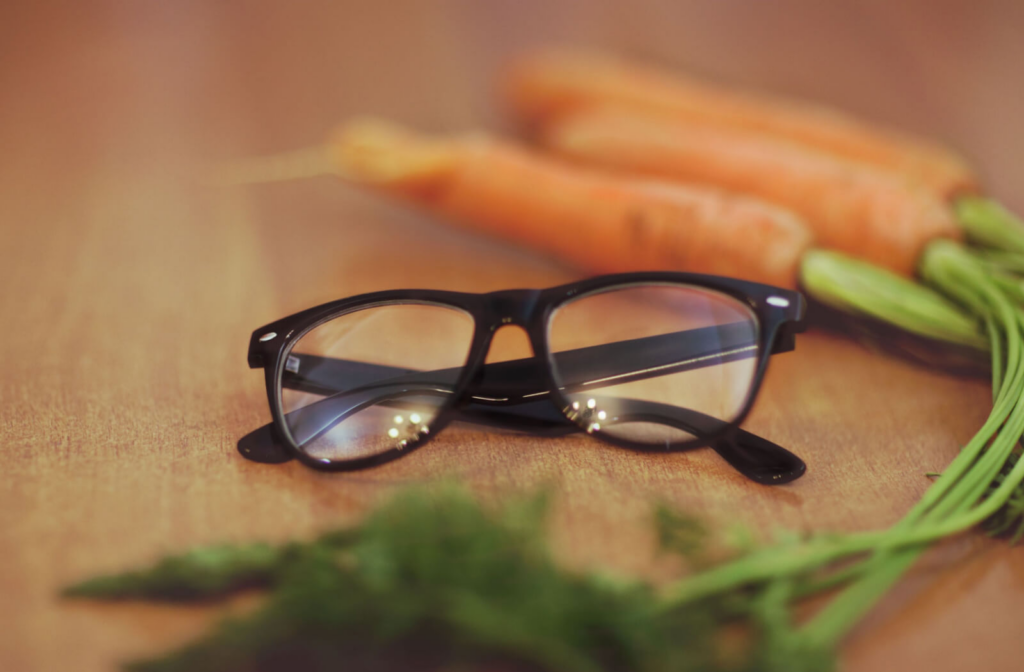You may have heard that eating carrots is a great way to avoid needing glasses or that carrots are a superfood for your eyes, the best way to maintain eye nutrition, and great for your vision. But is this true? Do carrots actually help your vision?
The idea was created during World War II as part of British propaganda to prevent the discovery of their radar system by claiming their pilots were eating so many carrots their vision improved. While this started as a campaign to hide their technology, it was partially true.
Carrots are high in an antioxidant that develops into vitamin A, which is excellent for helping keep your cornea healthy.
However, eating carrots isn’t enough to keep your eyes healthy. It’s important to regularly schedule comprehensive eye exams with your optometrist to make sure your vision remains clear!
What’s the Connection Between Carrots & Vision?
The original idea that carrots help your vision came about in World War II. The British Royal Air Force launched a campaign called “Carrots Keep You Healthy and Help You See in the Dark,” intended to explain why so many German planes were suddenly shot down at night.
Britain claimed that their pilots were eating a significant amount of carrots, which improved night vision, making their air force superior.
Instead of carrots, the British developed a high-tech radar system that allowed their forces to shoot down enemy planes. The campaign for carrots was simply propaganda to hide the development of their radar. Eventually, it led to the myth that carrots are the best way to improve eyesight.

How Do Carrots Help Your Vision?
Carrots are a rich source of something called beta-carotene, which your body converts into vitamin A. Vitamin A helps your body with:
- Improving your immune system
- Potentially lowering your risk of cancer
- Increasing bone strength and health
- Improving skin health
One of the most beneficial things vitamin A does for your body is it helps keep your corneas healthy and can help prevent the development of night blindness—a difficulty seeing things clearly at night commonly caused by a vitamin A deficiency.
It’s important to note that eating carrots alone isn’t enough to keep your eyes healthy. You should always be scheduling regular comprehensive eye exams with your optometrist so they can help you with your vision.
Also, there is too much of a good thing. While vitamin A is excellent for your eye health, consuming too much can be harmful. While it isn’t common, vitamin A toxicity can lead to various symptoms, including nausea and headaches.
How Do Carrots Affect Your Eyes?
In addition to vitamin A, carrots have other beneficial nutrients that help your eyes. These include lutein and zeaxanthin, types of carotenoids that help the macula in the eye. This part of your eye is responsible for building sharp and clear central vision. These two nutrients can also help prevent age-related macular degeneration (an eye disease that can lead to vision loss).
It’s also been suggested that a diet rich in vitamin A, lutein, and zeaxanthin can help prevent the later development of cataracts.
In addition to those three, carrots are also a great source of vitamins C and E. These are antioxidants that can help prevent cellular degeneration in the brain. Carrots also contain fiber, which provides many of its health benefits.
Interestingly, it’s been suggested that carrots could help with diabetic retinopathy. Since many of the nutrients and antioxidants found in carrots can help with the eyes, and fiber helps with blood sugar, there is research examining the effects of carrots on diabetes. However, there is not enough evidence yet to determine how much of a difference they can make.
Do Carrots Actually Improve Your Vision?
Although the idea of carrots helping improve vision developed during World War II as propaganda, there is some truth to it—they contain many things that are excellent for maintaining healthy vision.
However, eating carrots isn’t enough to keep your eyes healthy. It’s important to eat a healthy and nutritious diet for proper eye nutrition, follow proper eye hygiene, and regularly schedule comprehensive eye exams with your optometrist. Book an appointment with us at Los Angeles EyeCare Optometry Group today to speak with a caring professional, and let us help you with your vision today.



